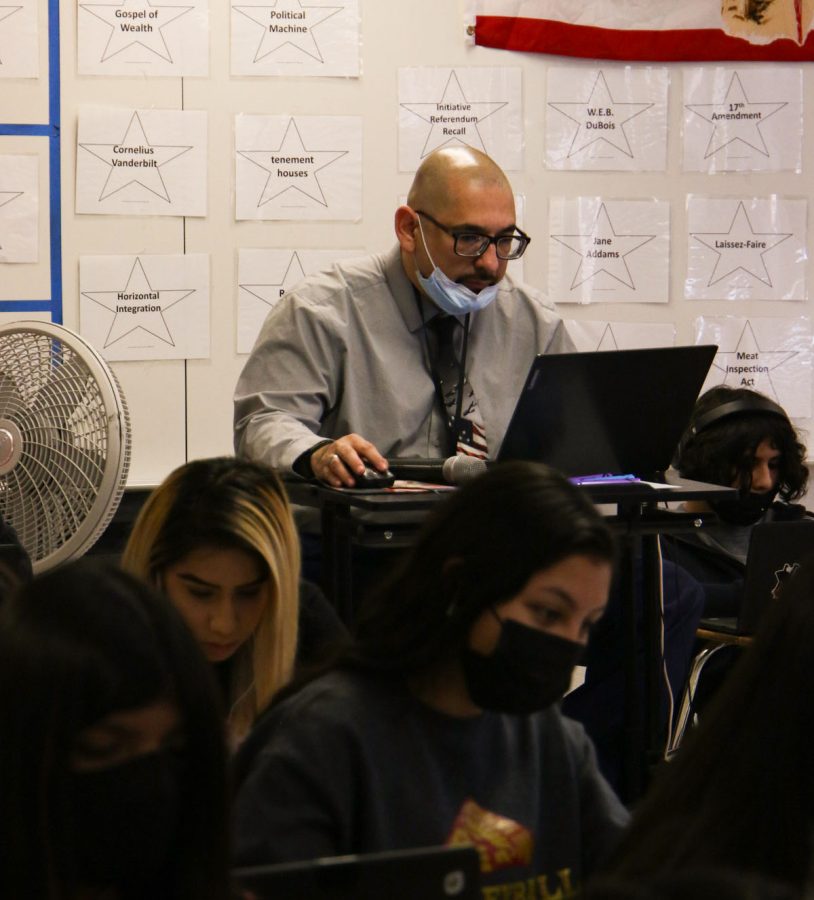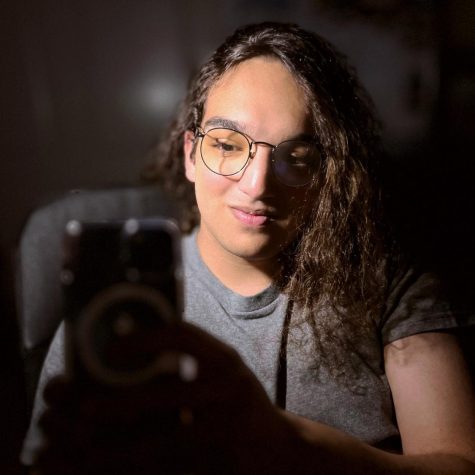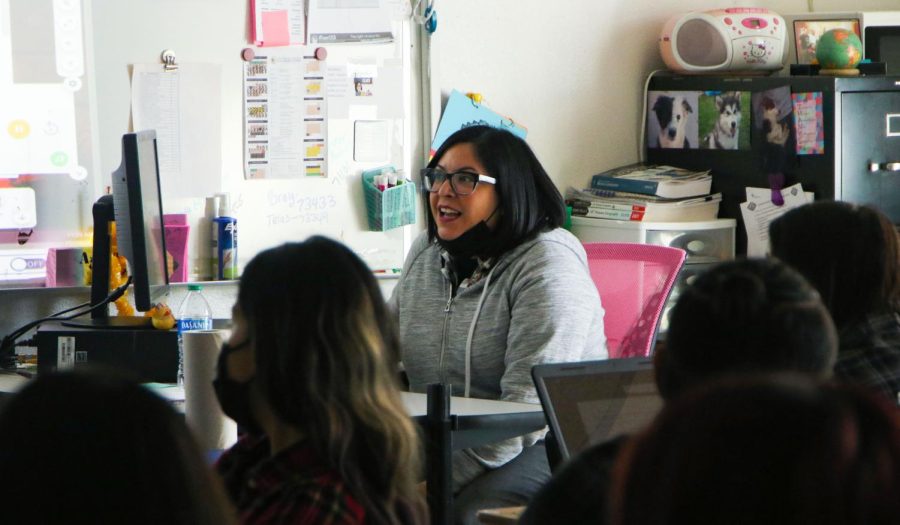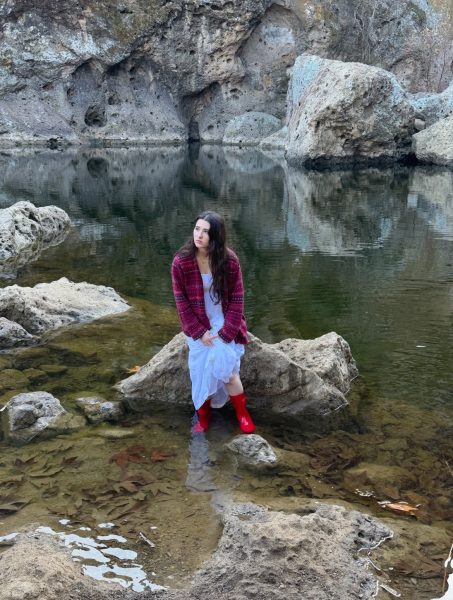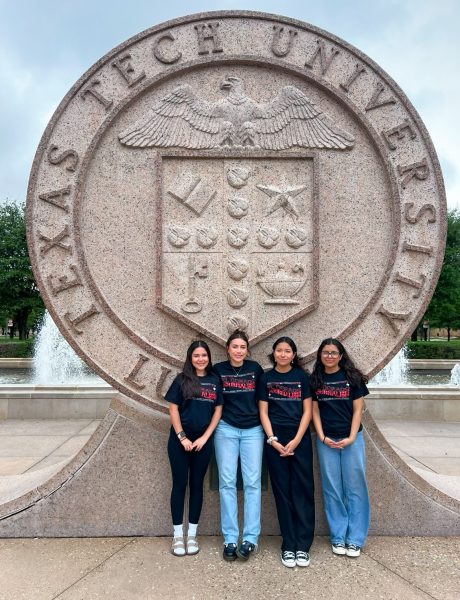Legislators ban CRT, push teaching ‘both sides of the book’
Educators share views about contradictory regulations for teaching current, controversial events in new state legislation
Photo by Brenden Malacara
AP Human Geography teacher Andrea Segura begins her class lesson on Dec. 14.
El Paso, Texas – As two bills limiting discussions on current events and differing viewpoints in social studies classes came into effect Dec. 3, teachers and local leaders are still confused on what set of rules they should abide by.
The bills, Senate Bill 3 and House Bill 3979, ban the teaching of critical race theory, a term that Rep. Steve Toth (R-The Woodlands), the author of the House bill called “evil and bigoted” in an interview with Newsmax. Texas State Board of Education member Georgina Perez (D-District 1) believes that the bills were made irresponsibly, preventing teachers from showcasing every perspective in history when teaching about current events.
“I believe history is history,” Perez said. “We should all learn from history, primarily because these are events that occurred; we should know them, we should all learn from them. The bill has a chilling effect on student discussions. It inherently censors student discussions, and it’s kind of like the ‘thought police’ are in the room now.”
The House bill, drafted by Rep. Toth, and the Senate companion, drafted by Sen. Bryan Hughes (R-Mineola), outlined that a teacher “may not be compelled to discuss a particular current event or widely debated issue of public policy or social affairs.” If a teacher chooses to discuss a topic, they must “to the best of the teacher’s ability, strive to explore that topic from diverse and contending perspectives without giving deference to any one perspective.”
“When we get into higher grades, maybe we have students that come into school and ask or want to have discussions about a current event,” Perez said. “How are teachers supposed to answer those questions? Why shouldn’t a teacher answer those questions? It’s not always appropriate for a teacher to say ‘go talk to your parents.’”
Teachers in advanced classes, such as dual credit or AP, have had the largest struggle with the conflicting regulations, with their history class curricula requiring discussion on current events. Andrea Segura, an AP Human Geography teacher at El Dorado, feels that the new regulations have confused her department on how to address events in her class.
“There are certainly points in history where the other side isn’t justifiable,” Segura said. “Even if I were teaching African American history, I couldn’t justify the lynchings in the South just like I couldn’t justify the murder of 6 million plus Jews and other people. It’s certainly a tricky situation the state has put us in.”
However, Ruben Ochoa, a dual credit government and US history instructor, says that the regulations are necessary to prevent teachers from “indoctrinating their students.”
“I believe you always need to teach both sides, obviously,” Ochoa said. “In an educational environment, students need to get different perspectives; it’s not my job to teach a student what I believe.”
Speaking about the recently successful Virginia gubernatorial campaign of Republican Glenn Youngkin, who advocated for banning critical race theory in Virginia K-12 schools, Ochoa denies that his class’ curriculum includes the teaching of critical race theory.
“I don’t agree with critical race theory because it’s basically picking on one group at the expense of the other group,” Ochoa said. “If you’re going to tell me that critical race theory should be taught, then are you going to teach the opposing side to people that don’t believe in critical race theory? There’s got to be a balance.”
At the time of publication, both Ochoa and Segura have yet to receive any direction, clarification or statement from district administration about how the legislation may effect the classroom. However, Segura has been able to find some flexibility around touchy subjects such as race since she teaches the AP curriculum, which leaves room for such topics.
“We tend to look mostly at cultures,” Segura said. “I would say in certain areas, when we’re talking about conflicts and things like that, you can certainly talk about race conflicts. But again, it doesn’t allow us to really get in depth that way.”
Daniel Escobar, the Chief Communications Officer for Socorro Independent School District, denied a request for an interview and provided this prepared statement about the district’s response to the bills:
“Regarding HB 3979, we do not teach critical race theory. We teach our state adopted standards that do include things like colonialism. That does not prohibit teachers from covering current events as they pertain to the real world such as the BLM movement,” the statement read.
Aztec Gold attempted to contact the author of HB 3979, Steve Toth, but did not receive a response by the time of publication.
As the semester comes to a close, teachers are still unsure about what rules and TEKS to follow, in light of the new legislation. The Texas Education Agency has, for the time being, issued temporary guidance on the new laws, saying that the laws do not limit “the teaching of or instruction in the essential knowledge and skills.”
